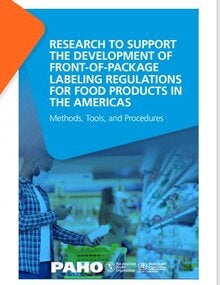Overview
This publication explores the subject of front-of-package labeling (FOPL) for food products as a means to help combat the trend toward unhealthy eating. It analyzes the methods, tools, and procedures of research into FOPL with a view to enhancing its role in regulations governing food products in the Region of the Americas. The publication makes recommendations relating to FOPL research – how it should be conducted, how results should be communicated, how FOPL schemes should be selected, and what the priorities should be. It also contains useful annexes that include, for example, a focus group discussion guide, a questionnaire, and a protocol for FOPL research. The Americas is the region of the world with the highest prevalence of overweight and obesity in the world. In 2016, noncommunicable diseases (NCDs) were responsible for 78% of all deaths in the Region. Thirty-four percent of these NCD-related deaths occurred prematurely in people between the ages of 30 and 69 years. This implies that NCDs have a huge economic impact on societies. Unhealthy eating is the main modifiable factor that is driving this situation. In particular, consumption of ultra-processed products and of processed products that are nutrient poor and energy-dense and contain excessive levels of nutrients associated with NCDs has been identified as a main contributor to the epidemic of overweight and obesity. From a public health perspective, the efficacy and effectiveness of FOPL labeling will mainly depend on its ability to encourage consumers to make healthier food choices and to reduce the purchase and consumption of products that impair diets and health.
|

